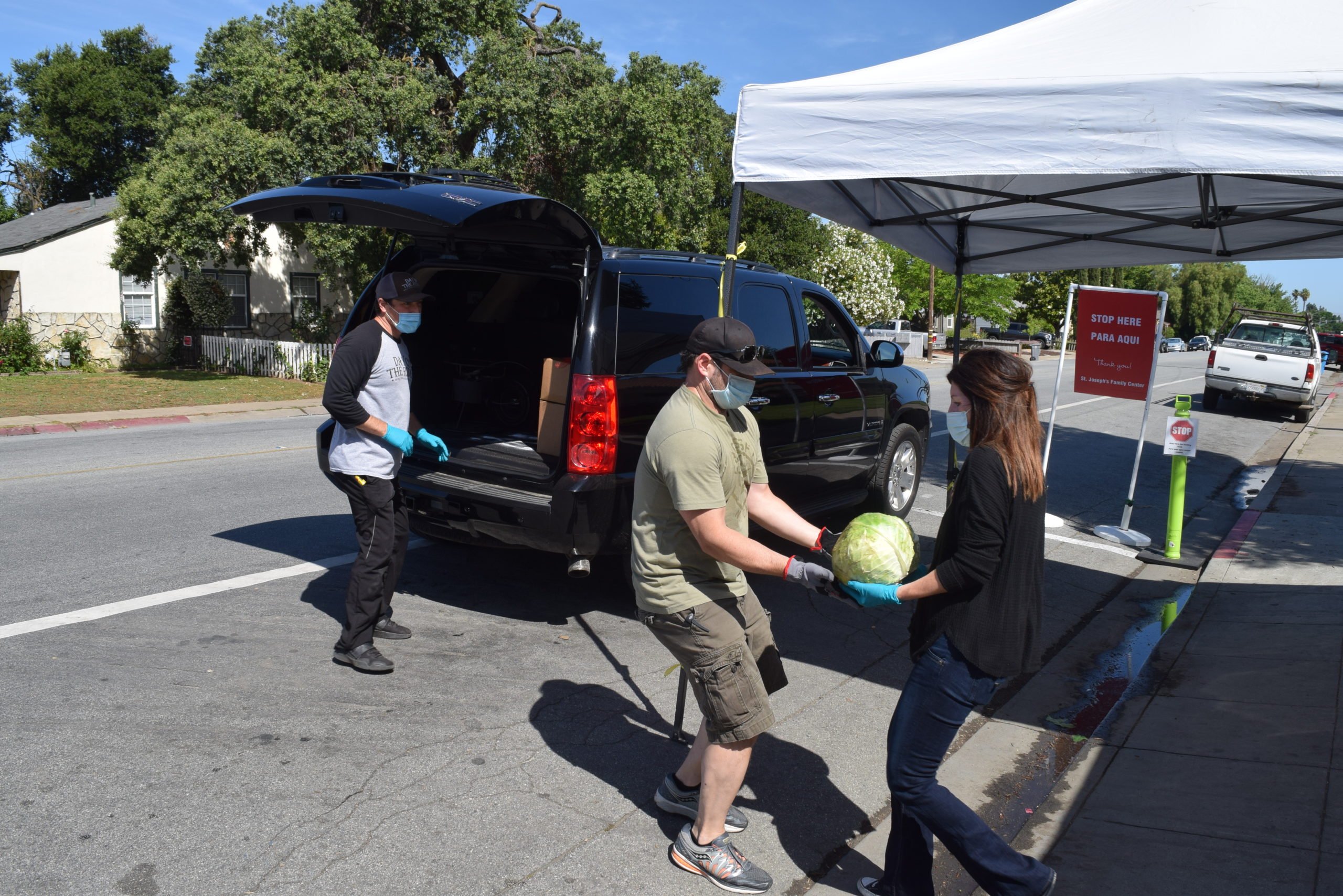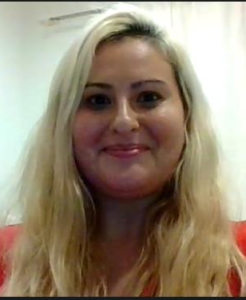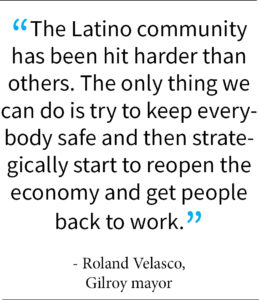Main story: Local Latino community hit hard financial by coronavirus
Resources become available to help those in need

Photo by Robert Airoldi
Volunteers with St. Joseph Family Center deliver food to those in need.
By Vanessa Soto

Vanessa Soto
Jose Jesus Gonzales, a garlic packer at Gilroy’s Christopher Ranch, is one of many Latinos whose working hours were severely cut by the COVID-19 crisis. Before the pandemic, he would work six days a week. Beginning in March, the producer employed him for only three to four hours per week.
“It’s necessary to earn enough to pay the bills, rent and everything that needs to be paid for,” Gonzales said.
 The 64-year-old man sustained a finger accident prior to the pandemic and had not been working. He has not received a cent from the disability insurance or the government stimulus check.
The 64-year-old man sustained a finger accident prior to the pandemic and had not been working. He has not received a cent from the disability insurance or the government stimulus check.
Latinos as a group have been hit the hardest in the region by COVID-19. They have 39 percent of the cumulative cases of coronavirus in Santa Clara County, the highest percentage compared to other ethnicities. In Gilroy, help is available from government and service organizations for those who have lost their job or are experiencing a drop in their work hours.
About 49 percent of Latinos in the U.S. say they or a person in their household has received a pay cut because of COVID-19, according to the Pew Research Center. This compares with 33 percent of all adults in America. Analysis from the group found about eight million Latino workers who work in hotels, restaurants and other service-sector positions are at a higher risk of job loss.
“The Latino community has been hit harder than others,” said Gilroy Mayor Gilroy Roland Velasco. “The only thing we can do is try to keep everybody safe and then strategically start to reopen the economy and get people back to work.”
Under the federal government’s Coronavirus Aid, Relief, and Economic Security Act (CARES) funding program, the Gilroy City Council has allocated $275,000 to community-based organizations, he said. St. Joseph’s Family Center, which provides pantry services, food services and rent relief to local residents in need, now has more funding to help low-income Latinos and other community members with paying rent. Families in the community who need rental assistance can call (408) 842-6662, ext. 21.
“We are trying to free up food, rental assistance, and provide the services that we can to the community,” Velasco said. “We are trying to reach out to various nonprofits that can support individuals and I know St. Joseph’s targets the Latino community.”
Velasco has spoken with many Gilroy Latino residents about their hours being cut and the impact this has on their lives. One employee at a local ranch that supplies mushroom products told him their workforce was at first stabilized when the coronavirus crisis started, but then they started doing some cuts “little by little” as the pandemic worsened.
Another person Velasco talked to who has been financially challenged by COVID-19 had a job at a restaurant. The dining industry has seen dramatic reductions in revenue as customers stay home to follow the stay-in-place orders issued by the county and state.
“When you can’t have dining-in services, hours get reduced as the company tries to keep all the employees. They kept them, but their hours were reduced and that causes additional strain,” Velasco said.
COVID-19 hits Latino families hard. Many in Gilroy suffer much stress when wage-earners receive a cut in their pay or job hours, a situation which is reflected through the rest of the nation. About 47 percent of Latinos surveyed by the Pew Research Center said the outbreak has changed their personal life in a major way.
Latino parents often struggle with their young children because some do not want to stay home during the quarantine, Velasco said. It’s difficult for many to adapt to the sudden change in family life.
“It is hard when you have a Latino family with young children,” he said. “They want to go out and play, they want to go to the park, they want to go hang out with their friends.”
The Gilroy Unified School District offers help to Latino children and their families who are struggling economically.
“Closing schools so quickly, transforming basically into an online format overnight, was tough,” said Debbie Flores, superintendent of the GUSD.
The district stationed buses with Wi-Fi in the parking lots at Antonio Del Buono, Rucker, South Valley, and Gilroy High, to support distance learning. Adding to the challenge, 300 families live in rural areas where they cannot connect to the hot spot and they do not have their own transportation to the sites. The district is now working on getting them an Internet hot spot or connecting them to one of the telecom providers, either Verizon or T- Mobile, that are offering a few months of free service, Flores said.
“In the interim, for every family that didn’t have a computer we’ve been making hard copies of the instructional packets that teachers are using with their students in their classrooms,” she said. “Now we have a professional company just making the copies and mailing them out to the families.”
Since March 16 when classrooms were closed due to the stay at home order issued by the county and students needed to learn online, the district has distributed about 4,000 computers to those families who needed them, Flores said. There are 1,000 left to go.
“We just started phase four and our goal is to get to a one-to-one ratio, so that every child not just every family has their own computer,” she said. “We hope to have that done by the end of May.”
Food is another consideration for families. Children who qualify for reduced priced meals at school sites will receive a Pandemic EBT (electronic benefit transfer). Each family can receive up to $365 for each child and the card can only be used to purchase food.
AT GUSD, 70 percent of the students are considered disadvantaged and many of those students are Latino, Flores said. The first focus of the district was making sure all the students get two meals a day. Free meals are given at seven school sites: Solorsano Middle, South Valley Middle, Antonio Del Buono Elementary, Glen View Elementary, Rod Kelley Elementary and Rucker Elementary. Meals can be picked up between 10 a.m. and 1 p.m. on Mondays, Wednesdays and Fridays.
Latinos families in Gilroy have also been struggling to pay for childcare during the quarantine. Many must leave their children alone at home to go to work. Others are forced to stop working to take care of their children.
A Pew study showed 40 percent of Latinos with young children say it has been difficult to handle childcare responsibilities.
Gavilan Community College offers a food distribution program to help families financially hit by COVID-19, said GUSD Board Member Linda Piceno. Every family that shows up gets meal assistance.
“I think it’s wonderful,” she said. “Any organization that can help is excellent.”
Gilroy’s Latino youth who are financially struggling can also receive help from the Latino Family Fund, a nonprofit with discretionary funding. It encourages young people to distinguish the difference between having a job and building a career. Employment that lets them work from home is usually based on having a higher education level, said LFF Co-chair Enrique Diaz, who is also on the GUSD board.
“We happen to have more jobs that don’t allow us to work from home,” he said. “People who have a career, they’re able to stay home, they’re able to isolate, they’re able to better self-care.”
A retired priest of St. Mary’s Catholic Church, Father Jose Antonio Rubio talked to two Latino community members who survived COVID-19. One is an unidentified man and the other is Gilroy activist Sally Armendariz.
“There’s a man, 37, who works in construction and he lived in a trailer park with his wife and two children, he contracted the virus,” Rubio said. “He didn’t isolate. Now his wife contracted the virus. One woman that I know was in the hospital for several weeks.”
Rubio has been doing weekly Zoom videos on the effects of COVID -19 on the local Latino community. His research reveals some Latinos are not taking this crisis seriously enough for their health and safety. His live videos can be watched on the St. Mary’s Facebook page.
Gilroy resident Stacey Silva lost her father, Gary Young, to COVID-19. He worked in the Gilroy Lowe’s Home Improvement store where, Stacey Silva believes, he contracted the virus because he would often shake people’s hands. Silva encourages everyone to practice social distancing to prevent similar tragedies.
“I recommend everyone wear a mask and wash their hands,” she said. “If they are going to the store, take hand sanitizer.”
